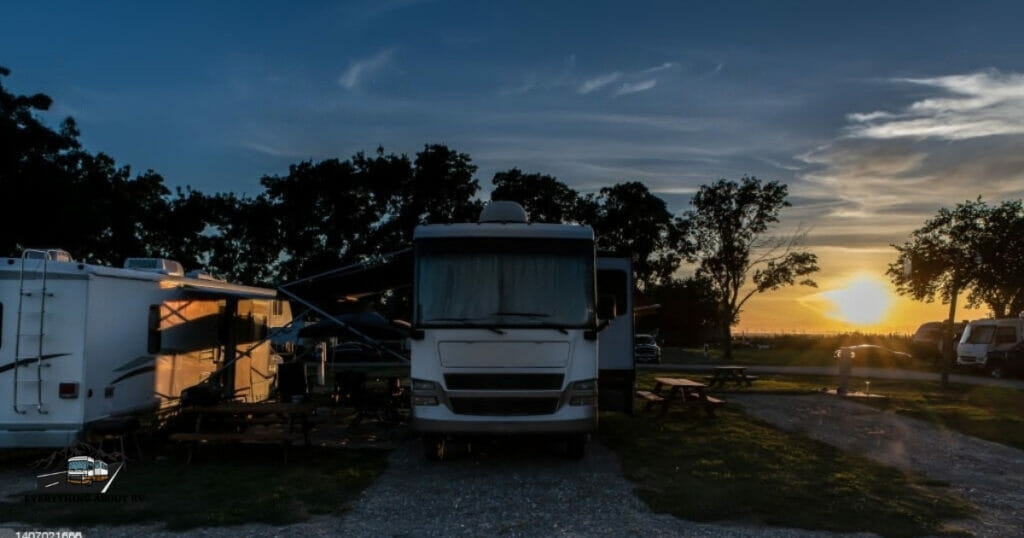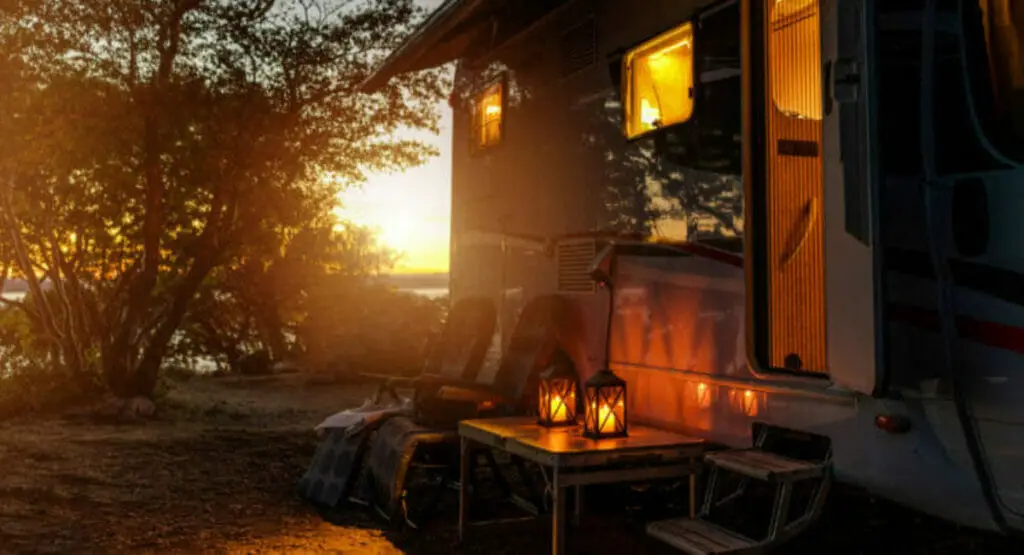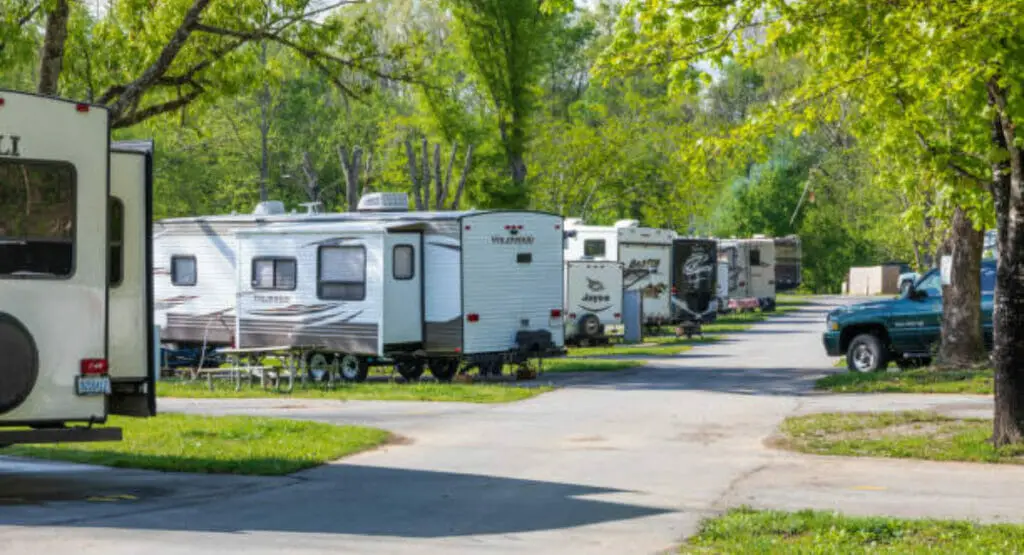In what states can you live in an RV full-time? Many people find living full-time in an RV to be an appealing way of life. The ability to embrace nature and adventure, as well as the freedom to travel and explore new places, are just a few of the reasons why this lifestyle has grown in popularity. Individuals who live in an RV can break free from the confines of a traditional home and experience a sense of liberation. The open road has become their backyard, and each day brings new discoveries and unforgettable experiences. The allure of full-time RV living captures the hearts of those seeking adventure, whether it’s the thrill of waking up to breathtaking landscapes, the joy of meeting fellow travelers along the way, or the freedom to change locations whenever desired.
I. Full-Time RV Living Legalities
A. Regulations and Zoning Ordinances
When considering full-time RV living, it’s critical to become acquainted with the regulations and zoning laws that govern this lifestyle. Regulations vary by jurisdiction, so research the specific rules that apply to the areas where you intend to park or stay. RV parking overnight stays, and even living in an RV on private property may be prohibited in some cities or neighborhoods. To avoid potential legal issues, it is critical to follow these regulations.
B. Requirements for Residency
Setting up residency is an important aspect of full-time RV living. Each state has its own set of residency requirements, such as the length of stay required to establish legal domicile. Examine the residency requirements of the state you intend to call home and make sure you meet them. Obtaining a driver’s license, registering to vote, and changing your mailing address may all fall under this category. Following the residency requirements will help ensure that you have the proper documentation to enjoy the benefits of full-time RV living.
C. Registration and Insurance of Motor Vehicles
It is critical for full-time RV living to properly register your RV and obtain adequate insurance coverage. When deciding on a state to live in, research the vehicle registration requirements. Some states may have separate registration requirements for RVs or motorhomes. It is critical to follow these regulations in order to avoid legal complications.
Additionally, make certain that your RV is adequately insured. Speak with insurance companies that specialize in RV coverage to find a policy that meets your requirements. Liability insurance, property damage coverage, and personal property coverage should all be included in comprehensive coverage. Being properly insured provides peace of mind and financial protection in the event of any unforeseen accidents or incidents.
Understanding and adhering to the legalities of full-time RV living ensures a more pleasant and enjoyable road trip. You can embark on your RV adventure with confidence and legal compliance by researching regulations and zoning laws, meeting residency requirements, and obtaining the necessary vehicle registration and insurance.
II. In what states can you live in an RV full-time?
State 1: Most Popular States for Full-Time RV Living in a Mild Climate
State 1 stands out as an ideal destination for full-time RV living in a mild climate. This state has a pleasant climate all year, making it ideal for those who prefer to avoid extreme temperatures. State 1 offers a balanced climate for year-round RV living, whether you prefer mild winters or pleasant summers.
The abundance of RV parks and campgrounds that cater to long-term stays is one of State 1’s main advantages. These parks frequently offer amenities such as full hookups, laundry facilities, recreational areas, and community events, ensuring that RVers have a comfortable and enjoyable stay. Furthermore, State 1 offers a wide range of attractions and activities, from beautiful beaches and scenic coastal drives to vibrant cities and cultural events. This state has something for every RVer looking for a pleasant climate and an enriching experience.
State 2: States with Low Costs for Full-Time RV Living
It is an excellent choice for those looking for affordability in full-time RV living. This state has a lower cost of living than many other regions, making it easier to maintain a budget while enjoying the freedom of the RV lifestyle.
State 2 has a plethora of RV parks and campgrounds with reasonable long-term stay rates. These parks frequently offer basic amenities at reasonable prices, such as electricity, water, and sewage hookups. Furthermore, the state’s low property taxes and overall affordability help full-time RVers live a more cost-effective lifestyle.
State 3: States with Beautiful Natural Parks for RVs
State 3 is a top choice for RV-friendly states with breathtaking natural parks. This state is well-known for its abundant natural beauty as well as its commitment to providing excellent RV facilities and services.
State 3 has a wide variety of natural parks, including majestic mountains, breathtaking coastlines, and vast forests. These parks have many RV-friendly campgrounds and scenic areas where RVers can enjoy nature’s wonders. State 3 has it all, whether you like hiking, fishing, wildlife watching, or simply relaxing in the great outdoors.
Aside from its natural beauty, State 3 offers RVers well-maintained infrastructure and amenities. Expect well-planned RV parks, clean facilities, and friendly staff who understand the special needs of full-time RVers. The dedication of State 3 to creating a welcoming and accommodating environment for RV enthusiasts makes it a must-see destination.
You can choose a location that aligns with your preferences and enhances your RV lifestyle experience by considering these top states for full-time RV living. Whether you value a mild climate, low cost of living, or access to beautiful natural parks, these states provide the ideal mix of features and benefits for your full-time RV journey.
III. Practical Considerations for Full-Time RV Living
A. Locating Appropriate RV Parks and Campgrounds (Best RV Parks for Extended Stays)
Finding appropriate RV parks and campgrounds is essential for a successful full-time RV living experience. Consider the following when looking for long-term accommodations:
1. Research: Use online resources, RVing forums, and review websites to learn about RV parks that allow for long-term stays. Look for parks with amenities such as large campsites, full hookups (water, electricity, and sewage), laundry facilities, and recreational activities.
2. Reviews and Ratings: Read reviews and ratings from other RVers who have stayed at the parks you’re considering. Consider cleanliness, management responsiveness, and the overall atmosphere of the park.
3. Location: Think about how close the RV park is to the places you want to go, the jobs you could do, or the services you’ll need. Choose a park that offers convenience and proximity to the places and activities that are important to you.
4. Pricing: Compare the costs of long-term stays at various parks, taking into account the amenities and services provided. Some parks may offer discounted rates for extended stays or monthly rates that are less expensive than daily or weekly rates.
B. Managing Utilities and Amenities While Traveling (How to Manage Electricity and Water in an RV)
Managing utilities and amenities effectively is critical for comfortable full-time RV living. Consider the following suggestions:
1. Electricity: Recognize the needs of your RV’s electrical system. Consider purchasing solar panels or portable generators to supplement your energy needs while boondocking or staying in locations that do not have electrical hookups. Conserve energy by using LED lights, turning off appliances when not in use, and tracking your power consumption.
2. Water: Keep an eye on your fresh water supply and wastewater tanks on a regular basis. Conserve this valuable resource by being mindful of your water usage. To reduce water usage in your RV, use water-saving fixtures and consider using campground facilities for showers and laundry. Plan ahead of time and be aware of where you can refill your fresh water tank and dispose of your wastewater.
3. Propane: If your RV uses propane for heating, cooking, or refrigeration, keep an eye on your propane levels and refill as needed. To ensure safe use, become acquainted with propane safety measures and regulations.
4. Internet and Connectivity: Investigate internet options for remote work or staying connected while traveling. To find the best solution for your connectivity needs, look into mobile hotspots, RV park Wi-Fi, or satellite internet services.
C. Getting a Domicile and Receiving Mail (How to Get Residency for Full-Time RV Living)
For full-time RV living, a legal domicile must be established. Consider the following steps:
1. State Requirements for Research: Understand the residency requirements of the state in which you intend to reside. Consider the minimum stay duration, the documents required for proof of residency (e.g., a driver’s license or voter registration), and the vehicle registration requirements.
2. Mail Forwarding: Set up a mail forwarding service to receive and forward your mail to your current location. These services give you a physical address where you can receive mail while you’re on the go.
3. Legal and Financial Considerations: Speak with a professional, such as an attorney or an accountant, to learn about the legal and financial implications of establishing residency in a specific state. Consider income taxes, healthcare accessibility, and vehicle insurance requirements.
You can improve your full-time RV living experience by following these practical considerations. Find suitable RV parks for long-term stays, manage utilities and amenities effectively, and establish a home to fully enjoy the freedom and adventure of life on the road.
Conclusion:
In what states can you live in an RV full-time? Living full-time in an RV offers a unique lifestyle filled with freedom and adventure. By familiarizing yourself with the legalities of RV living, exploring the top states that cater to full-time RVers, and considering practical considerations, you can embark on an incredible journey of exploration and self-discovery. The choice of the best state for your full-time RV living experience depends on your preferences, whether it’s a mild climate, affordability, or access to beautiful natural parks. Once you’ve found your ideal state, hit the road and embrace the wonders of the open road. Experience the joy of waking up to breathtaking landscapes, connect with fellow travelers, and create unforgettable memories. Living full-time in an RV opens up a world of possibilities and allows you to fully embrace the spirit of adventure. So, pack your bags, choose your state, and let the journey begin!



